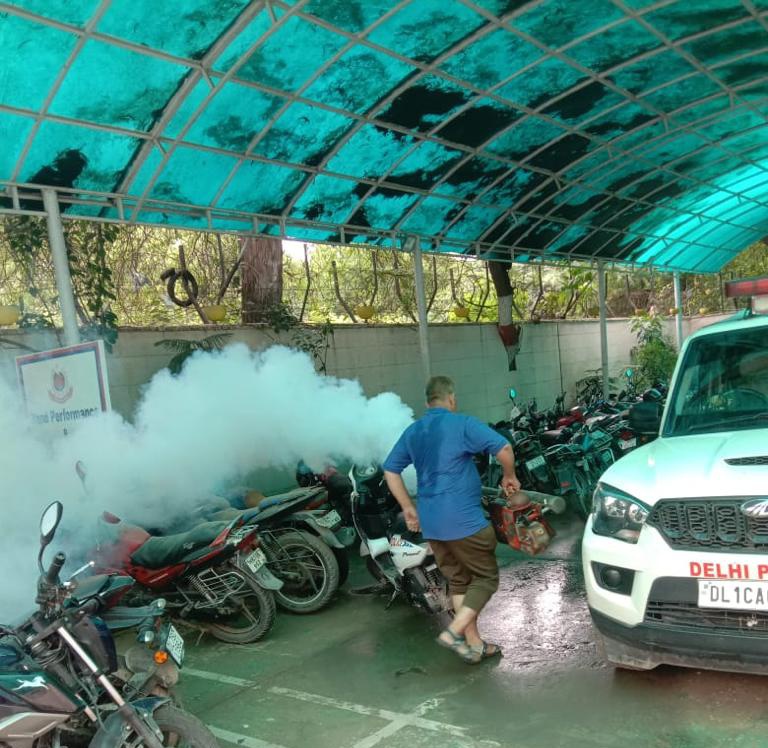
Fumigation is done in various places of Delhi to kill mosquitoes that spread dengue
Delhi reported 105 new cases of dengue in the first week of August, as per the report released by the Municipal Corporation of Delhi.
The cumulative tally of dengue cases for this year reached 348 as of August 5, following the inclusion of 105 new cases. This is the highest dengue case count recorded in the past six years during the period.
In contrast to the 348 dengue instances documented between January 1 and August 5, 2023, the city had registered just 174 cases during the same period in 2022, 55 cases in 2021, 35 cases in 2020, 47 cases in 2019, and 64 in 2008, the report said.
In view of the rise of dengue cases, the Delhi government decided to reserve 5% beds in government hospitals for dengue patients and provide test reports within six to eight hours of admission.
Dr Sonu Kumar Bhardwaj, Joint Secretary of Federation of All India Medical Associations (FAIMA), said that they have seen the rise in cases of DENV-3 dengue.
“Although DENV-2 is the most common dengue fever, we have seen rising cases of DENV-3 as well,” he told Patriot. There are four types of dengue fever: DENV-1, DENV-2, DENV-3, and DENV-4, with DENV-2 being the most fatal.
“There is no particular reason behind the rise of such cases. It’s just that we are witnessing these serotype-specific features of dengue more often this year.”
On July 18, Health Minister Saurabh Bharadwaj said that there is a high incidence of dengue among children, and they are more vulnerable to the disease.
According to Dr Siddhartha Tara, President of Resident Doctors’ Association at NDMC Medical College and Hindu Rao Hospital, exposure of children to clogged water in playgrounds and other areas makes them more vulnerable to the diseases.
“Children, in any medical case, are more vulnerable because their immune system is not as strong as that of the adults. There is no other reason except for that,” he explained.
Dr Bhardwaj echoed the same concerns and said that preventive measures should be strictly enforced in the city.
“We see this every year. The cases rise every monsoon due to waterlogging and stagnant water in various areas,” he said.
“Since it started raining, we have seen some rise in cases of dengue.”
“It is very important to remove the waterlogging, maintain hygiene, and stagnant water should also be removed. Even if we give 30 minutes of our time to maintain hygiene and cleanliness, there are high chances that we would not catch the fever. Things like mosquito nettings should be used. These are the basic precautionary measures that we should take,” he added.
Since dengue is a virus, he added, the first symptom is often a viral fever in the initial stage.
“Once the patient starts to get rashes, he should consult a doctor and get tested. It is extremely important for patients to get treatment on time. If one ignores the early signs during fever and takes medicines without proper medical check-up, the situation may worsen. A timely medical intervention will help the patient immensely,” he said.
Doctors also added that for viruses such as dengue, there is no permanent solution, and the corporation can only implement preventive measures to contain its transmission.
The Delhi government came up with a ‘mega action plan’ to prevent the spread of dengue in the city. The commissioner of Municipal Corporation of Delhi was also directed to “deploy drones” for monitoring and controlling mosquitoes, especially in high-risk locations like construction sites, nurseries, and vacant residences with hard-to-reach rooftops.
“Dengue homework cards” were also distributed in both government and private schools. These cards are reviewed by class teachers on a weekly basis to create awareness about dengue prevention among children.
“The cards have helped us understand the disease and its preventive measures better. We are more careful of the waterlogging and keep the hygiene in our surroundings,” said Nasreen Khalid, a resident of Brahmapuri, whose child studies in a government school in Seelampur.
Delhi hosted what organisers describe as the world’s first player auction in golf, launching ‘72…
An elderly woman recalls how her six-year-old granddaughter lay bleeding after a speeding car hit…
Municipal Corporation of Delhi plans a unified policy enabling RWAs to adopt and maintain parks…
A 17-year-old boy allegedly died by suicide after jumping before a moving train at Uttam…
Delhi High Court grants bail to 26-year-old Thar driver accused of mowing down two in…
Two Rohini men arrested for fatally stabbing one person and injuring another during a robbery…